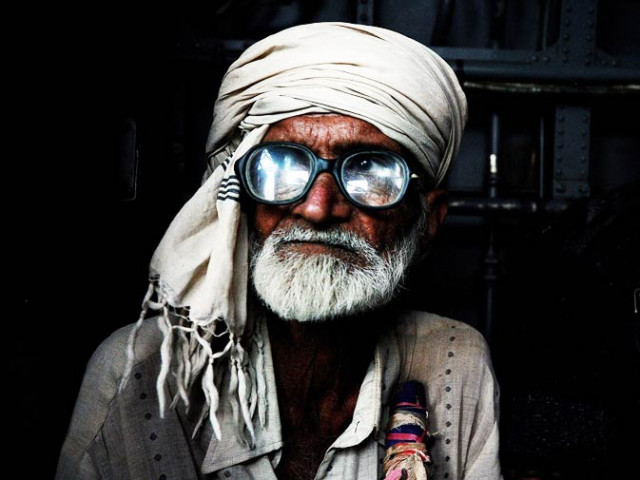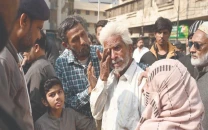With no welfare in sight, the elderly prone to abuse
By 2050 almost 16% of Pakistan’s population will be over 60 years old

By 2050 almost 16% of Pakistan’s population will be over 60 years old, however, the government is yet to pass legislation for the welfare of these individuals. PHOTO: AFP
Advances in health care have led to better management of chronic diseases such as diabetes and hypertension, and expanded life spans. However, eventual health complications are causing more and more of Pakistan’s over 10 million elderly people to steadily become disabled and dependent on the more functional and younger people.
Unfortunately, in society today, our youth not only feels but is also projected as somewhat invincible, whereas the elderly have become victims of social isolation, neglect and even abuse.

What is elder abuse?
The United Kingdom-based organisation Action on Elder Abuse defines it as a single or repeated act which causes harm or distress to an older person. Physical, emotional, sexual abuse and neglect as well as financial exploitation are the different categories of elder abuse, of which the most commonly witnessed are physical abuse and financial exploitation, according to a 2012 study of the World Health Organization.
About 4% of Pakistan’s population is aged 65 years or above, according to Pakistan Demographics Profile 2014 on indexmundi.com. This percentage constitutes a sizeable number of people susceptible to potential abuse, over 8 million.
We have all grown up in a protective, ancestral joint family system. However, with a rapid decline of social infrastructure as we see nowadays, the traditional family system is now being challenged more often, resulting in misbehaviour towards and maltreatment of older family members.

At present, no reliable elder abuse figures exist for Pakistan which is probably because of the occurrence of such acts behind closed doors, within the privacy of homes and care institutions, compounded by a lack of proper reporting systems for elder abuse.
Screening at home and the ER
As emergency physicians working in a major hospital, we have noticed how the emergency room (ER) stays flooded with geriatric patients, even though it is an inappropriate referral setting for primary healthcare for them.
As the ER is now turning into a first point of patient contact, it is imperative for doctors to identify elderly victims of actual or potential abuse. Careful scrutiny is needed when the medical problem being presented does not match the reported history from the elderly person and their accompanying caregivers, or when problems are simply blamed on age-related physical and mental decline.
Certain warning signs may allow doctors to pre-empt possible abuse such as frequent arguments between the caregiver and elderly person and a change in the behaviour of the patient. If there is suspicion of elder abuse, observe the potential victim for physical injuries, behaviour or mood changes and signs of neglect such as a dirty and unkempt appearance.
It is rather unfortunate that we avoid discussing potential or actual abuse-related issues presumably out of respect for family privacy. To overcome the hesitation in approaching and dealing with the issue, a medically and scientifically rigorous methodology is needed. The Elder Abuse Suspicion Index, based on a questionnaire format, is an easy to use tool for busy ER personnel which can assist them in identifying patients who might be experiencing abuse.
Moreover, families who hire caregivers to look after their elders should be warned continually to look out for loss of resilience and depression in the patient, the caregiver’s perception that taking care of the elderly is burdensome or substance abuse in them. If any of these occur, efforts should be made to not leave the elderly unattended and the caregiver should be promptly removed from duty.
Advocating for the elderly
Unfortunately, in Pakistan, simply identifying an actual or potential victim of elder abuse will not curtail the problem because of the lack of strong law enforcement and legal frameworks that can protect the rights of the elderly.
Khyber-Pakhtunkhwa (K-P) is the only province in the country to have passed legislation to ensure the welfare of senior citizens; it approved the law last year. However, on the federal level no such legislations exist; a draft bill titled Pakistan Senior Citizens Welfare Act 2007 is yet to be approved by the government even though years have passed since it was drafted. Similarly, a draft senior citizens bill is also pending in the Sindh Assembly since 2013.
Steps need to be taken at the national and societal level to raise awareness about elder abuse. An event held in 2013 in Islamabad to observe World Elder Abuse Awareness Day was a positive and much needed step in the right direction, but nothing significant has happened since.
Starting small, hospitals can establish links with relevant NGOs which can provide protection and shelter to people suspected or confirmed to have faced abuse. Much deserved attention from the government of Pakistan is also required; it should provide necessary funding and resources and enact strict policies and laws to ensure medical practitioners act immediately if they come across any such patient.
A concerted effort by the medical community in tandem with NGOs, law enforcement agencies and legal fraternity, all backed by national policies, can ensure a safer and more dignified existence for the elderly among us. That’s the least we can do for them.
About the Authors: Muhammad Akbar Baig MBBS MD is a resident trainee in emergency medicine; Asad I Mian MD, PhD is an associate professor of emergency medicine



















COMMENTS
Comments are moderated and generally will be posted if they are on-topic and not abusive.
For more information, please see our Comments FAQ